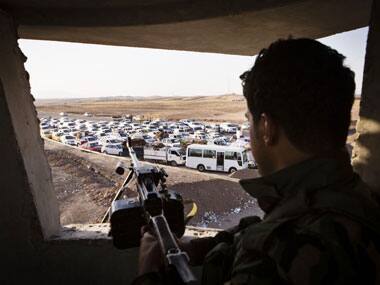Narendra Modi, faced with the first major crisis erupting from foreign shores since he took over as Indian Prime Minister on 26 May, held consultations with his security and foreign policy experts on Wednesday after it became clear that 40 Indian construction workers were kidnapped from Mosul, Iraq. What worsens the situation further is that there is no ransom call yet from the kidnappers. The Prime Minister is understood to have asked his National Security Advisor Ajit Doval to tap all sources in ensuring that the kidnapped persons are rescued and brought back unharmed. Needless to say, the focus here is on the word ‘rescue’. [caption id=“attachment_1577231” align=“alignleft” width=“380”]  Representational image. Reuters[/caption] For Doval too this is the first major challenge in his new avatar as NSA. The former chief of the Intelligence Bureau (IB), who supervised IB’s operations for decades, is no bunny in this area. The government is all clammed up on the issue. Ministry of External Affairs spokesman Syed Akbaruddin confirmed on Thursday afternoon that 40 Indians in Mosul had been abducted, based on information received from international agencies. However, Akbaruddin refused to answer any of the ‘W’s — who did it; when it happened; why and how; and where the hostages are being kept. He repeatedly said that he could not divulge “any operational details” and added that the details were so scanty and trickling in so slowly that “Even the International Red Crescent is not aware of their location”. Significantly, when Akbaruddin was asked whether the Indian authorities, who were in touch with various humanitarian and international agencies, could guarantee the safety and well-being of the kidnapped Indians, he said the situation was very tenuous and no guarantees could be given. When this writer asked him one-on-one after his briefing whether the Indian construction workers were kidnapped while they were being evacuated to be taken to a safe place and whether it was a botched up evacuation operation, Akbaruddin reiterated that he was not in a position to speak anything about operational issues. The MEA briefing was largely called for giving updates about the visiting Russian deputy Prime Minister Dmitry Rogozin’s four-hour talks with External Affairs Minister Sushma Swaraj. In fact Swaraj was still in an adjoining room even after the briefing was over. Eventually, the largely attended MEA briefing was overshadowed by the Iraq crisis. Asked about the update on the 40 nurses from Kerala who are trapped in Tikrit, Akbaruddin said, “We have requested the Red Crescent to try and contact them and assure their security and welfare. Red Crescent said that they had gone met there and told them in the communication that it is not appropriate to take a surface route.” The magnitude of the crisis that is staring in the face of Prime Minister Narendra Modi is reflected by the fact that major powers are constantly revising their plans and strategies in Iraq. The United States, for example, which earlier actively considered launching air raids on terrorists’ locations in Iraq is now reportedly backtracking. The reason is that while air raids sound good on paper and make great news for TV channels, such actions can go awry because of inaccurate intelligence. Hours later, President Barack Obama will be holding a bipartisan meeting with Democratic and Republican lawmakers to thrash out a comprehensive approach in Iraq but till then he has put on hold the idea of launching air raids on militants’ targets in Iraq and focus on sharing real time intelligence with Iraqi government instead. Saudi Arabia, a major stakeholder and a vested interest party in Iraq, the region and the entire Islamic world, has rocked the boat further and warned of a high-stakes war ahead in Iraq. Saudi Foreign Minister Prince Saud al-Faisal was quoted as saying on Wednesday in Jeddah that the ongoing turbulence in Iraq “carries warning signs of a civil war with unpredictable consequences for the region.” The voices emanating from these two major powers and stakeholders put it in perspective how the kidnappings of 40 Indian nationals, perhaps by suspected ISIS militants, is a serious challenge for Prime Minister Modi and his most dependable asset Ajit Doval. The writer is a Firstpost columnist and a strategic analyst who tweets @Kishkindha.
The PM is understood to have asked his National Security Advisor Ajit Doval to tap all sources in ensuring that the kidnapped Indians in Iraq persons are rescued.
Advertisement
End of Article
Written by Rajeev Sharma
Consulting Editor, First Post. Strategic analyst. Political commentator. Twitter handle @Kishkindha. see more


)

)
)
)
)
)
)
)
)



